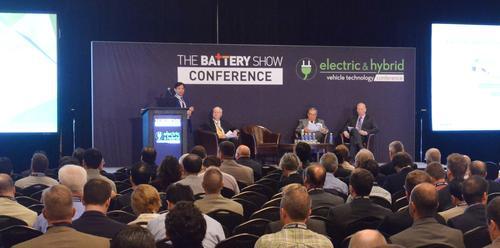Battery industry leaders made a case yesterday for automakers to consider lead acid chemistries as the car industry
moves toward increased electrification.
Two keynote speakers at The Battery Show outside Detroit said that new versions of the nearly 150-year-old
lead-acid battery technology might be better suited than lithium-ion for near-term applications in hybrid cars,
mild hybrids,and micro-hybrid vehicles. The speakers said they see lead-acid as an alternative to lithium-ion
in certain applications and not as a replacement for it in fully battery-powered vehicles.
”There is no silver bullet when it comes to battery technology,” noted Subhash Dhar, CEO of Energy Power
Systems at The Battery Show’s “Leaders Debate” forum. “Whether we talk about lead-acid, nickel-cadmium,
nickel-metal hydride, or lithium-ion, every chemistry has a value proposition for its given application.”

Battery industry leaders at The Battery Show near Detroit said the U.S. Advanced Battery Consortium
needs to expand its goals beyond the quest for the lithium-ion-based “Holy Grail.”
In particular, Dhar cited start-stop vehicles, which need long cycle life and low cost in their batteries, as
candidates for lead-acid chemistries. He also said that lead-acid makes more sense than lithium-ion in
mild hybrids and fullhybrids,which typically use relatively small battery capacities of just 1 kWh or 1.5 kWh.
“While lithium-ion is a high-performance battery, it does have high costs associated with it,” he said. “We
need to come up with a low-cost solution that’s acceptable to the user community.”
Dhar was one of two speakers at the Leaders Debate who supported lead acid. Robert Flicker, chief operating
officerof East Penn Manufacturing , also argued that automakers need to consider lead-acid beyond the traditional
SLI(starting, lighting, and ignition) applications. East Penn is conducting its own field tests on hybridized, lead-acid
versions of the Honda Insight, Honda Civic, Volkswagen Passat, and Ford Focus, he said. It is also working on
lead-acid-based vehicles with 42 V electrical architectures.
Also at the show, the Advanced Lead-Acid Battery Consortium displayed a Dodge Ram truck that combines
lead-carbon batteries with a natural-gas-powered engine. The truck uses the lead-acid batteries as part of a
start-stop system that helps reduce emissions and fuel costs.
Flicker argued that lead acid makes particularly good sense in applications that don’t require high energy and a
long driving range. There, he said, lead acid’s low cost could be desirable. ”If we want to have a true impact on CO2,
then we have to focus on what’s cost effective,” he told an audience of engineers in his keynote.
Experts at the show said that advanced lead-acid based battery systems cost about $100/kWh, whereas finished
lithium-ion packs typically cost between $200/kWh and $300/kWh and sometimes more.
Asked whether the US Advanced Battery Consortium’s 25 year quest to create a “Holy Grail” battery should
continue,keynote speakers were unanimous in saying that the quest should be broadened. “We need to come up
with a systematic approach to combine the technologies we have today, as opposed to spending all our time on
the Holy Grail,” said Dhar.



